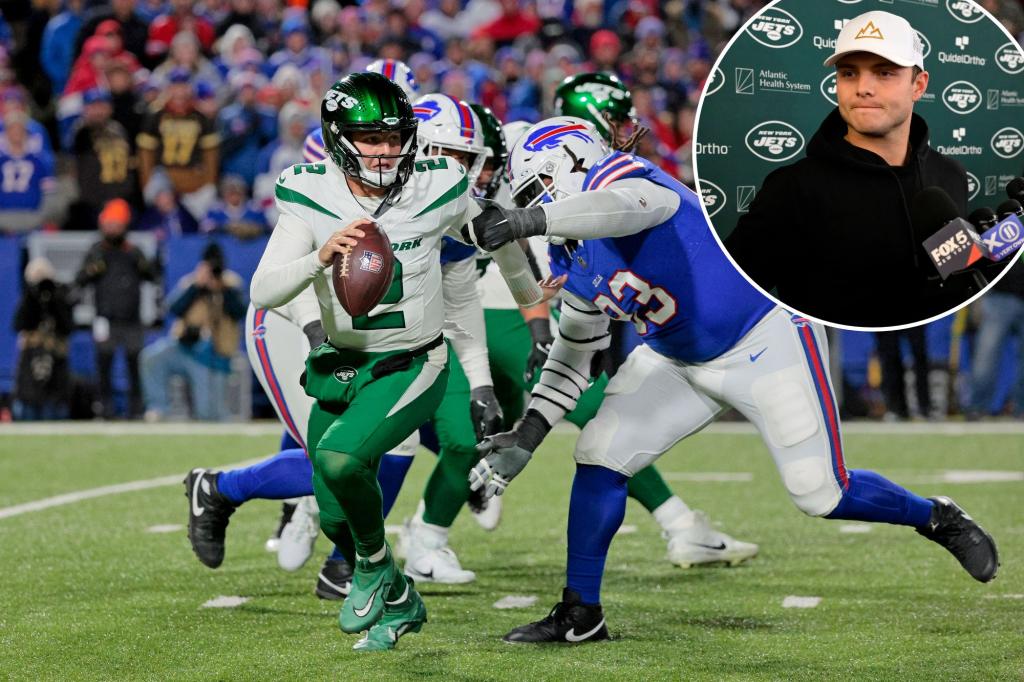Even if a benching torpedoed his past two seasons, Zach Wilson thought this year — and this version of the struggling Jets offense — felt different.
It was easy to point the blame at him in 2022, he said.
That’s why Robert Saleh benched him in favor of Mike White almost exactly one year ago.
This time, it was tough to “point the finger at anybody,” Wilson said Tuesday in his first comments since the Jets handed the offense to Tim Boyle.
He wouldn’t label himself as the scapegoat of an offense averaging the third-fewest points per game (15.0) and compiling historically poor red-zone and third-down percentages.
Wilson understood that even if his six touchdowns and seven interceptions — identical to his 2022 numbers — implied otherwise, he sensed improvements and strides that helped him “come a long way” after last year’s demotion.
But Wilson didn’t hide from the reality of his situation.
The offense has two touchdowns since Week 8.
The Jets went 41 possessions without finding the end zone.
He wasn’t surprised when the Jets benched him for Boyle or even shocked when they bumped Trevor Siemian ahead of him on the depth chart, sliding Wilson to the No. 3 spot and the emergency-quarterback role.
“I can sit here and say I’ve had a bunch of growth and tremendous whatever this year, but if you’re not scoring touchdowns, it doesn’t matter,” Wilson said. “It really doesn’t.”
There were times when he resembled a different quarterback, when the lessons from and observations of Aaron Rodgers in the offseason and preseason seemed to materialize.
Wilson wasn’t supposed to start for the Jets this year.
In an ideal scenario, where his Achilles didn’t tear and Rodgers didn’t miss time, he would’ve watched.
Would’ve seen how the 39-year-old and four-time MVP handled games — and maybe even the playoffs.
But everything changed four offensive snaps into the season, and even when Wilson guided the Jets to three consecutive wins — against the Broncos, the then-undefeated Eagles and the Giants — the offense still produced underwhelming results. The Jets tried changing everything around Wilson.
Eventually, the only thing left to change was their quarterback.
“When you’re not scoring touchdowns consistently and we’re letting our defense down and we’re not putting up points, what do you expect?” Wilson said. “If you keep doing the same thing, nothing’s gonna change, so I understand.”
He hasn’t thought about his future with the Jets. Saleh pushed that decision to the offseason, when Wilson’s third year will flip to the fourth and final — unless the Jets opt to pick up his fifth-year option — year on his rookie deal.
But Wilson has been benched three times in the past two seasons, the common denominator through an offensive coordinator change where the unit declined even more.
When asked about his outlook, Wilson said he wants to see this Jets offense succeed — even if it’s Boyle or Siemian quarterbacking it instead of him — and then “we’ll handle the rest later.”
So Wilson has returned to the exact scenario of last season, just one year later and with more long-term uncertainty.
He’ll be the No. 3 quarterback against the Dolphins, eligible to play only if Boyle and Siemian both leave injured.
Wilson didn’t consider that “a shot” by Saleh.
He said he doesn’t think Saleh would ever do that.
Instead, as with everything about the latest benching and quarterback change, it all boiled down to the situation. To the facts that have become more and more difficult to deny.
To the reality — or, really, to the déjà vu — that has the Jets right back where they were last November, with a spiraling season and a disjointed offense and a former No. 2 overall pick that needed to be replaced.
“We’re kind of at that point, let’s find something that’s working because whatever we’re doing now is not working,” Wilson said of being the No. 3 option. “… We need to make changes. Things aren’t working. We gotta score points.
“And that’s how you do it.”
Source









